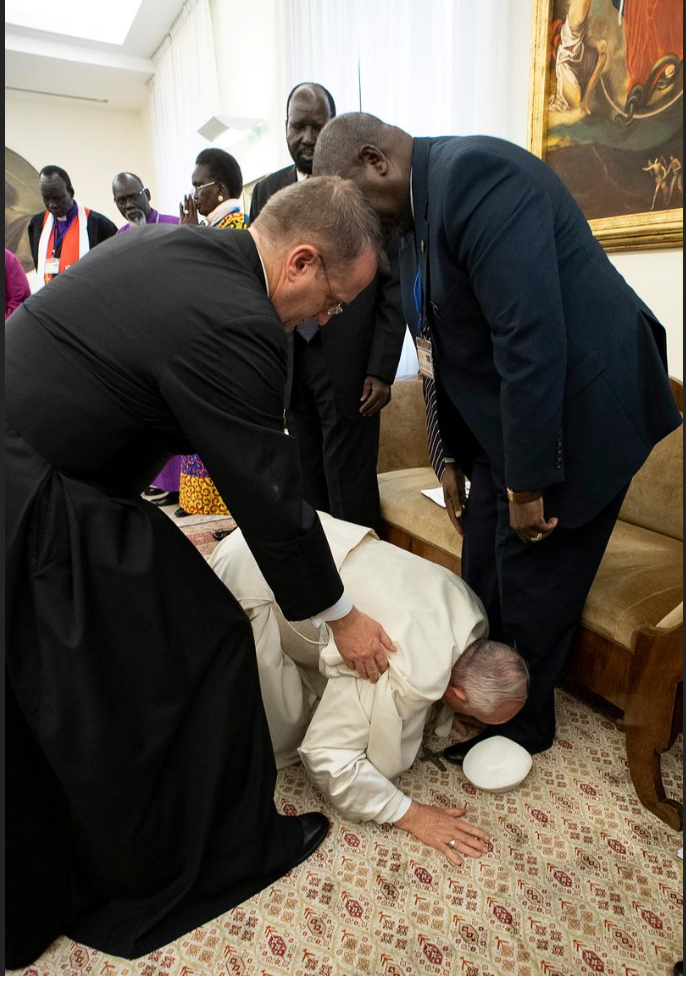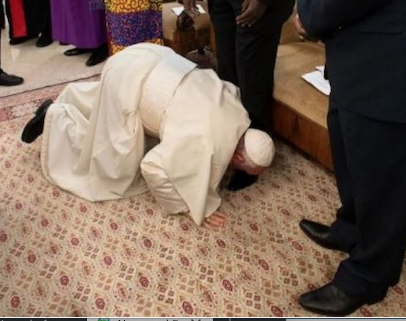There are moments in this media-conscious pontificate that compel us to turn our eyes away. To keep on looking is to risk stumbling over the edge of the Slough of Despond.
“And his disciples remembered that it was written: ‘Zeal for thine house will consume me.’” (John 2:17) That Johannine passage came to mind when I saw the photograph of Pope Francis kissing the shoes of the leaders of opposing sides in the South Sudan’s brutal civil war. The man we call Vicar of Christ groveled at the feet of the president of South Sudan, the leader of his opposition, and several others in the room—as if a papal kiss equips tribal enemies to sally forth in harmony and goodwill.
Intended as an icon of Christ-like humility, it was too immoderate to be anything of the kind. It was, instead, an ostentatious pantomime, the sign of a man without passion for his own—metaphoric—house, and disconnected from the bounds of his office. So yes, an unworthy householder. An embarrassment to all under his roof. To you and to me.
The photos had been taken this past April at an unprecedented—not to say eccentric— Vatican retreat intended to bolster a tenuous armistice in the five-year slaughter between warring factions in the South Sudan. What holds me here is not the chaotic politics and lethal ethnic rivalries of the newly independent South Sudan. Neither is it lack of sympathy for the travails of a tribal nation. Rather, it is the jolt of the images themselves.
Their grotesqueness is prophetic. We have seen Francis on his knees before, in burlesque of Jesus washing the feet of his disciples. What is more grating about this particular media moment? Why does it not move me? But instead registers as a totem of moral exhaustion?
In Jesus’ day it was common practice to offer the refreshment of a foot bath to guests who had walked, barefoot or in sandals, over the dust and dirt of unpaved roads. Ablution was conducted by a slave or servant in the homes of hosts who could afford one. (Jews, too, kept slaves if they had the means.) Servant or none, a basin and towel were ordinary elements of hospitality.
In performing that homely task himself, Jesus endowed a conventional act with new meaning. In his hands, it became an emblem of a sacred call to service, even unto death. He transformed a workaday act into a sacramental one extended only to chosen disciples—and not until the final moments of his ministry. With the cross already in sight, Jesus issued a symbolic summons to his own beloveds, men destined to suffer cruelties for following the pattern he gave them.
In his public life, Jesus did not wash the feet of all and sundry. Neither did he place an obsequious kiss on a single foot. He knelt in solitary prayer, never in genuflection to any worldly power, whether benevolent or malign. There was no showboating in that upper room in Jerusalem. Yet here is Francis bootlicking in a show of . . . of what? Artless sincerity? Impassioned peace-making? Compassion for a stricken nation unaccustomed to self-rule and hobbled by lack of those very Western structures that Francis disdains?
Look for your answer in the cameramen invited in for the occasion. (There was more than one, judging from this shot of one cameraman by another.)
Reuters called it “a dramatic gesture.” Indeed. It was also a dishonest one, a self-aggrandizing, theatrical simulacra of humility by a well-protected man in the security of his own apartments. Moreover, having one’s shoes smooched is not a quotidian rite for visitors to the papal digs. Try to imagine Francis on his knees caressing the shoes of any Western leader in a plea for reconciliation of political divisions. President Trump’s shoes, you think?
Not for nothing is this pope bending to the ground before African leaders. President Salva Kiir, a Dinka, and his Nuer opponent Riek Machar incarnate Francis’ cherished pueblo, a mystical category that derives more from Romantic primitivism than from Christianity. The cattle culture dominant in the South Sudan encompasses some 60 indigenous ethnic groups and a Babel of dialects, many unintelligible to each other. Such is the playing field for the messianic pretensions of a man enamored of the imagined integrity of tribal cultures unsoiled by modernity.
This is the way a civilization ends: in obeisance to its own illusions.






